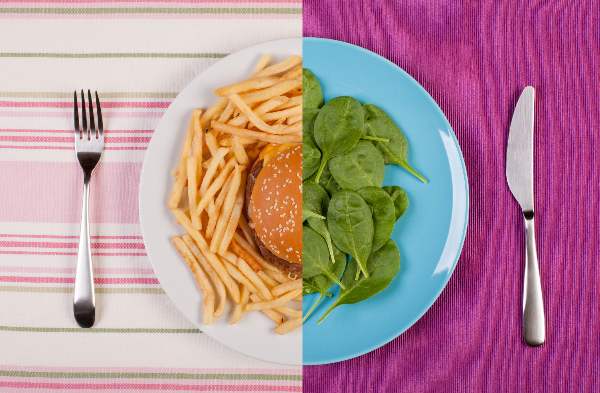Did you know?
In some circumstances you can calm your eczema symptoms by making small amendments to your diet?
Change your diet to help control eczemaThere is a definite conversation taking place about the relationship between your diet and your acne symptoms so it’s definitely worthwhile taking a deeper look at what you should and should not be eating if you suffer from acne. In this page, our Skin Advisor Felicity Mann takes a look at your diet, how it may affect your acne symptoms and some simple changes you can make to help.
Although there is no direct correlation between your diet and acne, in recent years more evidence is emerging to connect the two issues.
Although further studies are still needed, research certainly seems to argue in favour and against certain food groups, with some findings even taking a closer look at nutritional deficiencies.
This shift in attitudes can only be a good thing, but there is still room for growth, which is why it’s still necessary to cover a few simple changes that you can put in place that may just make the world of difference to the overall health of your skin!

Acne has been associated with several nutrient deficiencies over the years, with studies revealing that acne patients are more likely to experience low levels of zinc, vitamin E and selenium. Other nutrients such as vitamin C are believed to help support your skin, reducing the inflammatory symptoms of acne.
In short, it can’t hurt to try and increase your intake of these vitamins and minerals, and you can do this easily through your diet.
Vitamin A is an extremely important nutrient for your skin, helping to repair skin cells and reducing inflammation. It’s even believed that vitamin A can help to unclog skin pores, making it particularly relevant when it comes to acne.
This is because of the nutrient’s relationship to keratinocytes, a group of skin cells that make up the majority of the epidermis. Vitamin A can help keratinocytes to mature, moving the dead cells to the outer layer of the skin, opening up your pores.1 Biotta’s Carrot Juice is an excellent source of vitamin A and it’s also known to have a whole host of benefits for your skin!
Best sources: Eggs, carrots, kale, broccoli, spinach and sweet potatoes
Recipes:
Poached Egg with Spinach on Wholemeal Toast
Sweet Potato & Kale Soup
Vitamin E is a fat soluble nutrient that is known to act as an antioxidant within the body, protecting your cells from free-radical damage and oxidative stress. Important for maintaining healthy skin, some studies have indicated that acne sufferers could potentially be deficient in vitamin E, with some research suggesting that as the severity of your acne increases, your levels of vitamin E may start to diminish.2
Given the role that vitamin E plays in protecting your skin cells, it’s important to try and make sure that you are getting enough vitamin E. Of course, topical vitamin E is already a popular skincare product, however there is little evidence that these topical lotions really improve the symptoms of acne.3
Best sources: Spinach, sweet potatoes, almonds, avocados, wheat germ and sunflower seeds
Recipes:
Potato Bake with Avocado, Mushrooms and Seeds
Apple & Spinach Smoothie
Zinc is a vital but often forgotten about nutrient that could play a big role in helping to support your skin. Studies have revealed that acne sufferers have 24% lower zinc levels than those with clear skin, not to mention that acne can help to kill the strain of bacteria responsible for the condition. If you want to learn more about zinc and its effect on acne, please read our blog, ‘Is zinc the best mineral for acne?’
Best sources: Pumpkin seeds, cashews, beef, eggs, chickpeas
Recipes:
Dry Roasted Curried Chickpeas
No Bake Carrot Cakes with Cashew Frosting
Selenium, similar to zinc, isn’t a nutrient that always receives the recognition it deserves. It works to protect antioxidants, decreasing inflammation. In a study conducted in 1984, patients were given supplements for selenium and vitamin E and it was recorded that the severity of their acne was greatly reduced.4
Since acne often goes hand in hand with inflammation, selenium is a particularly useful nutrient to have on your side, although it may work best when taken alongside vitamin E and zinc.
Sources: Brazil nuts, chicken, sardines, eggs, spinach
Recipes:
Grilled Honey Lemon Sardines with Herbed Rice
Spinach & Potato Curry (Saag aloo)
1http://www.facingacne.com/role-vitamin-a-treating-acne/
2https://www.acneeinstein.com/zinc-for-acne/
3http://www.healthline.com/health/minerals-vitamins-for-acne#3
4http://supernaturalacnetreatment.com/can-selenium-cure-acne/

Just as there are nutrients you should be trying to include in your diet, some food products may upset your symptoms, usually by influencing your production of certain hormones or inspiring an inflammatory response. Of course, moderation is key so don’t feel as though you have to completely eliminate these foods from your diet. Sometimes simply lowering your intake will have a positive effect.
In our blog, ‘Do dairy products really cause acne?’ we explored the less than favourable effects that dairy can sometimes have on acne sufferers. Once described as the ‘perfect food for acne’, certain dairy products can contain IGF-1, a growth hormone. This hormone can stimulate the production of sebum oil and even promote an inflammatory reaction. If you are worried about dairy, I would try making some slight changes to your diet to reduce your intake – consider non-dairy alternatives to milk, such as almond milk or soy milk.
The research connecting acne and alcohol is limited but a couple of studies have demonstrated that a link may exist. After all, alcohol can affect your inflammatory responses, hormones and levels of bacteria. For example, high levels of the male hormone androgens can lead to acne and drinking alcohol can increase your levels of oestrogen and testosterone.5 Alcohol is also believed to have an inflammatory effect on the body, so it may upset certain acne symptoms by making you more susceptible to inflammation.
Refined sugar is definitely not good news for your skin and by extension your acne symptoms. Too much sugar can affect your immunity and blood-glucose levels, making you more susceptible to being overwhelmed by pathogens and causing an insulin spike! If your body is producing too much insulin it can stimulate the production of sebum oil, exacerbating your acne symptoms and making you more prone to a breakout. If want to learn more about sugar and your skin, please check out our blog, ‘The bitter truth about sugar and your skin.’
Speaking of insulin, some believe that high glycaemic foods such as sugar, flour, bread and rice may also not be the best news for your skin. This is because these types of food can raise your blood glucose levels, again stimulating the production of more insulin. Now it’s important to note that bread refers to white bread, which is far more refined and processed than its wholegrain counterpart. You don’t have to give up certain food groups entirely, but you can make a few simple switches. Coconut sugar, for example, has a comparatively low GI index compared to ordinary sugar, while sweet potatoes can stand in for ordinary white potatoes.
 Looking for our products in a store near you?
Looking for our products in a store near you?
Not sure whether your favourite health food store sells our products?
To find your local independent store selling our products, just type your postcode below.

In some circumstances you can calm your eczema symptoms by making small amendments to your diet?
Change your diet to help control eczemaDiscover the story of Alfred VogelNature is just about the best thing we’ve got!